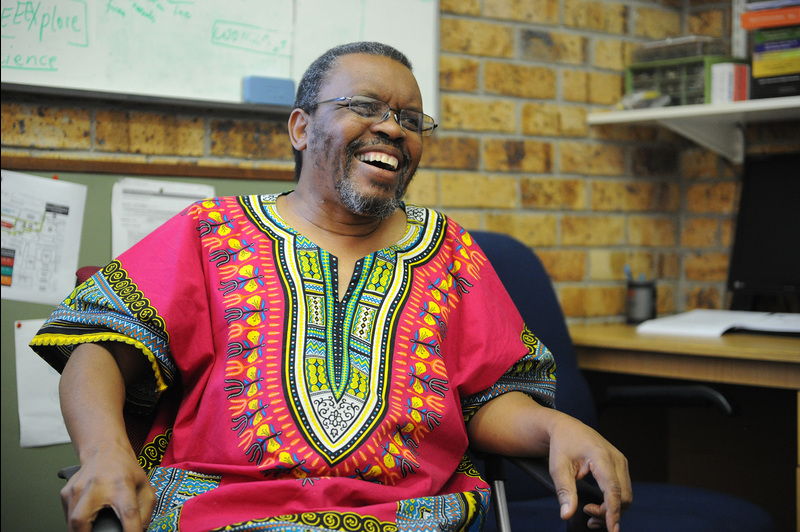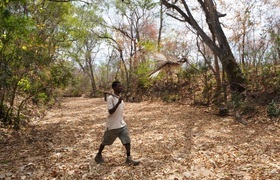Mqhele Dlodlo appointed VC at NUST
04 May 2018 | Story Ambre Nicolson. Photo Robyn Walker. Read time 7 min.
Associate Professor Mqhele Dlodlo has dedicated his life to academic scholarship. Now, as he takes up the role of vice-chancellor at the National University of Science and Technology (NUST) in Bulawayo, Zimbabwe, he hopes to share his love of learning with a new generation of students.
Dlodlo’s career took him from an idyllic childhood at Matopo, near Bulawayo in Zimbabwe, to the United States and back again, and to the Netherlands, before he joined UCT in 2004 as an associate professor in the Department of Electrical Engineering.
He was appointed to the position of vice-chancellor at NUST in April 2018.
“NUST is an institution which has been close to my heart ever since my earlier engagement with it between 1992 and 2004.
“I am sad to be leaving Cape Town, which has been a second home for myself and my family, but I’m looking forward to improving the staff morale at NUST and building on the university’s original aim of providing high-quality professionally focused qualifications to the next generation of Zimbabweans.”
Matopo to Pennsylvania
Dlodlo remembers how, even as a small child growing up in the family homestead at the Matopo Mission, the adults around him impressed on him the importance of a good education. It was a lesson he took to heart from an early age.
“I was blessed,” he says. “I grew up in a beautiful rural setting, but I also had the benefit of living in a place which was quite cosmopolitan.”
Dlodlo’s grandfather, the family patriarch, was a church minister. “There was a constant stream of people of all colours and nationalities coming and going in our home.”
He describes the milestones of his childhood as a mix of both the traditional and the contemporary. “I remember the pride I felt when I was allowed to be herdboy of my family’s cattle for the first time. They were very beautiful Nguni cattle.”
Equally, however, he still recalls the names of his two primary school rivals: Soneni Ngwenya and Winette Mpofu. “Some years I was ahead, some years one or the other of them took the top spot. It was a fierce competition.”
After completing elementary school he went on first to Matopo Secondary School and later to complete his A levels at Thekwane High School near Plumtree, where he excelled at his studies.
“It was 1974 and we would travel to school through Bulawayo either by train or by bus. During this phase of my life, my schoolmates and I had become politically aware and we would follow the armed struggle on shortwave radio,” he says.
“We listened to a combination of the BBC World News, Radio Moscow, Zambia Broadcasting Corporation and Radio Maputo. By listening to all of them we figured out what was happening and how close we were to independence. It was a thrilling time.”
Dlodlo had set his sights on pursuing tertiary studies somewhere away from home, as long as it was not the University of Rhodesia. As it turned out, he won a tuition scholarship to Messiah College,a Christian liberal arts college in Grantham, Pennsylvania, in the United States, to study pre-engineering physics.
While there, he won a fully funded scholarship through UNESCO to study at Geneva College in Beaver Falls, Pennsylvania.
“It is my hope that I can see NUST rise up the university rankings and deliver on its promise to provide sound, pragmatic and useful professional qualifications to young Zimbabweans.”
There and back again
“When I arrived at Messiah College I expected to feel some culture shock,” says Dlodlo, “but in fact I felt at home immediately.”
He again dedicated himself to his studies. “I found that my teachers in Zimbabwe had prepared me so well that I found first-year mathematics to be quite familiar.”
He completed his BSc in electrical engineering at Geneva College in 1980, and went on to earn a second bachelorʼs degree in engineering management and mathematics, with a systems emphasis.
Before graduating he proposed – via letter – to his childhood friend and sweetheart, Flora Dube. They married in 1979 but had to wait to be together until January 1980 when Dube’s visa application to study in the US was successful.
“Three years later she graduated with an interdisciplinary degree in biology and hospital administration. Our first daughter had been born three days before the graduation ceremony, so I collected the degree certificate for Flo.”
In 1983 Dlodlo and his family returned to Zimbabwe. He began working as a lecturer in electronics at Bulawayo Polytechnic, later becoming the lecturer in charge of the telecommunications technician training stream and head of department in electrical craft.
He returned to the United States in 1987, this time to Kansas State University in Manhattan, Kansas, where he completed his masterʼs studies in electrical engineering, specialising in advanced semiconductor materials engineering.
“It was another small town like Grantham village and Beaver [Falls], but this time I found it less pleasant since I had to leave my family, including my two young daughters, in Zimbabwe.”
When NUST was started in 1990 Dlodlo was one of the Foundation Committee members who created the programmes and helped get teaching and learning under way.
After helping to design the professionally focused degree programme at NUST in 1992 and spending some time teaching, Dlodlo once again travelled to a different continent, to pursue further studies.
“I went to complete my PhD at Delft University,” he says, “but this time I took my whole family with me. We were a household of scholars. Every day my wife and I would go to university while our two daughters went to school. In the evenings we would all gather round the table to do our homework together.”
Cape Town to Bulawayo
In 2004 Dlodlo joined UCT as an associate professor in the Department of Electrical Engineering. Over the course of his time at UCT he focused on telecommunications research while also becoming assistant dean for internationalisation with an Afrocentric focus.
“Cape Town is not a small town but it is a very beautiful city and one that welcomed my family,” he says. “After more than a decade I am now returning to almost the place where I began.”
His dedication to learning and sharing knowledge will remain. “It is my hope that I can see NUST rise up the university rankings and deliver on its promise to provide sound, pragmatic and useful professional qualifications to young Zimbabweans.”
 This work is licensed under a Creative Commons Attribution-NoDerivatives 4.0 International License.
This work is licensed under a Creative Commons Attribution-NoDerivatives 4.0 International License.
Please view the republishing articles page for more information.










